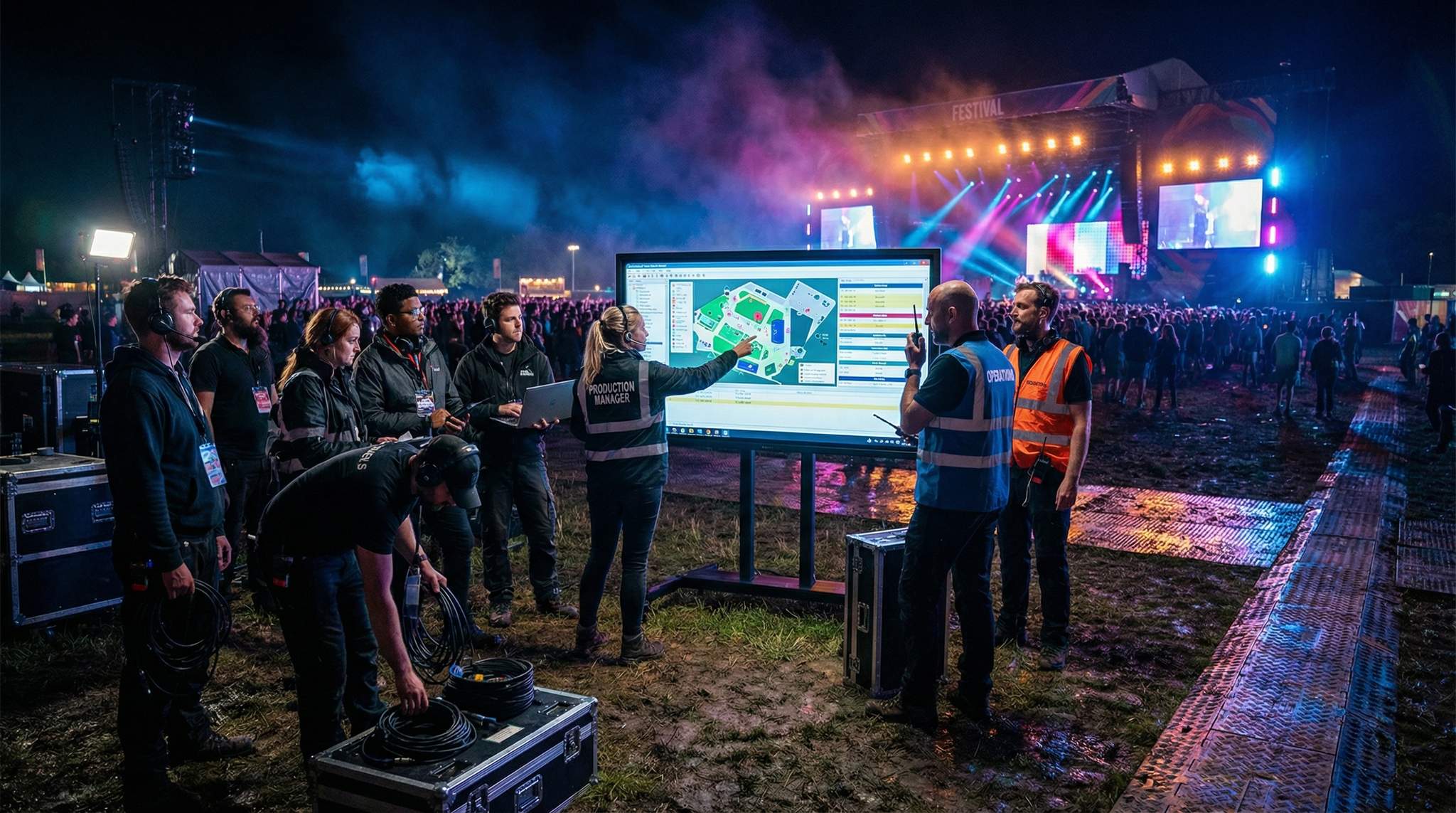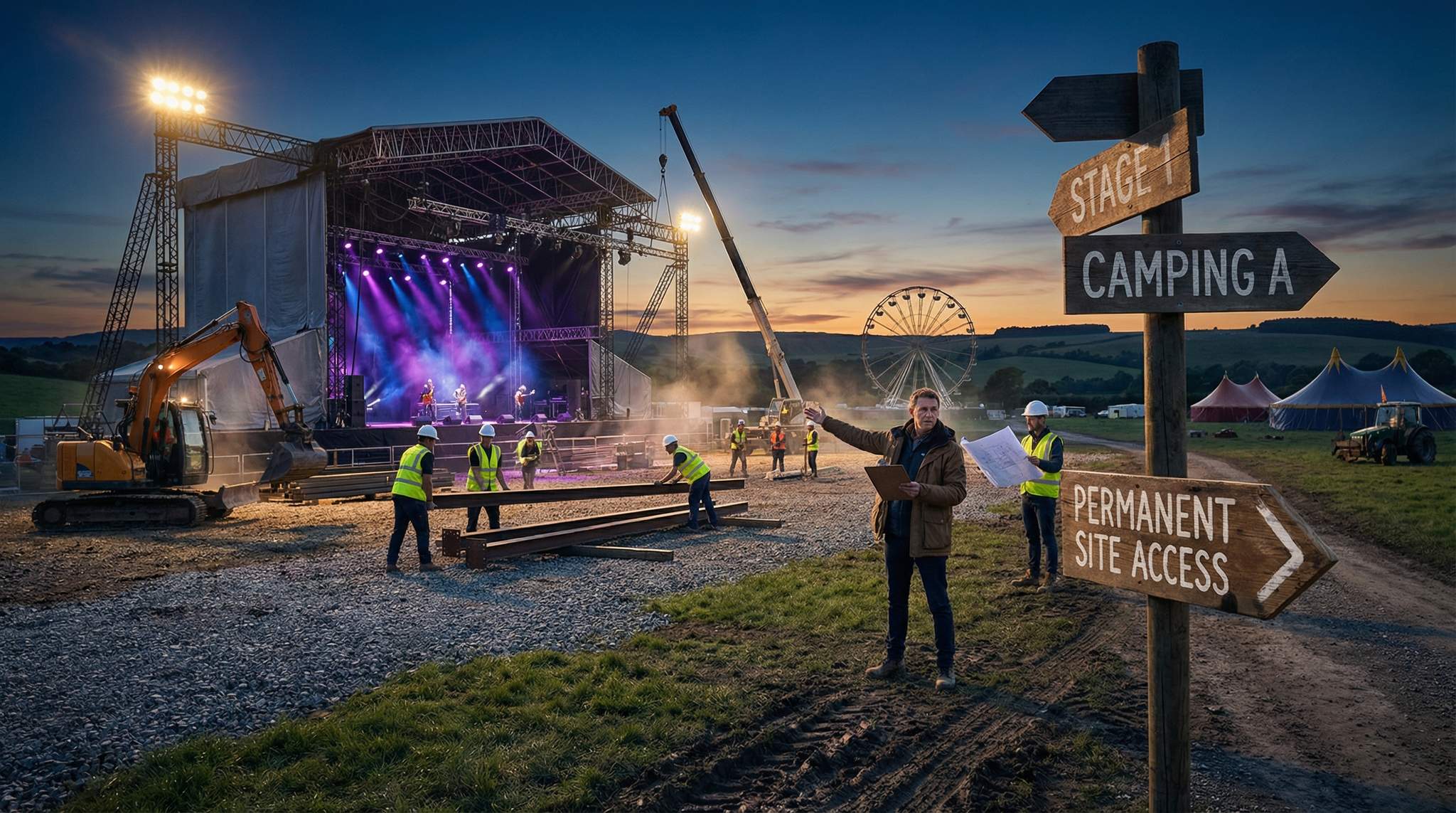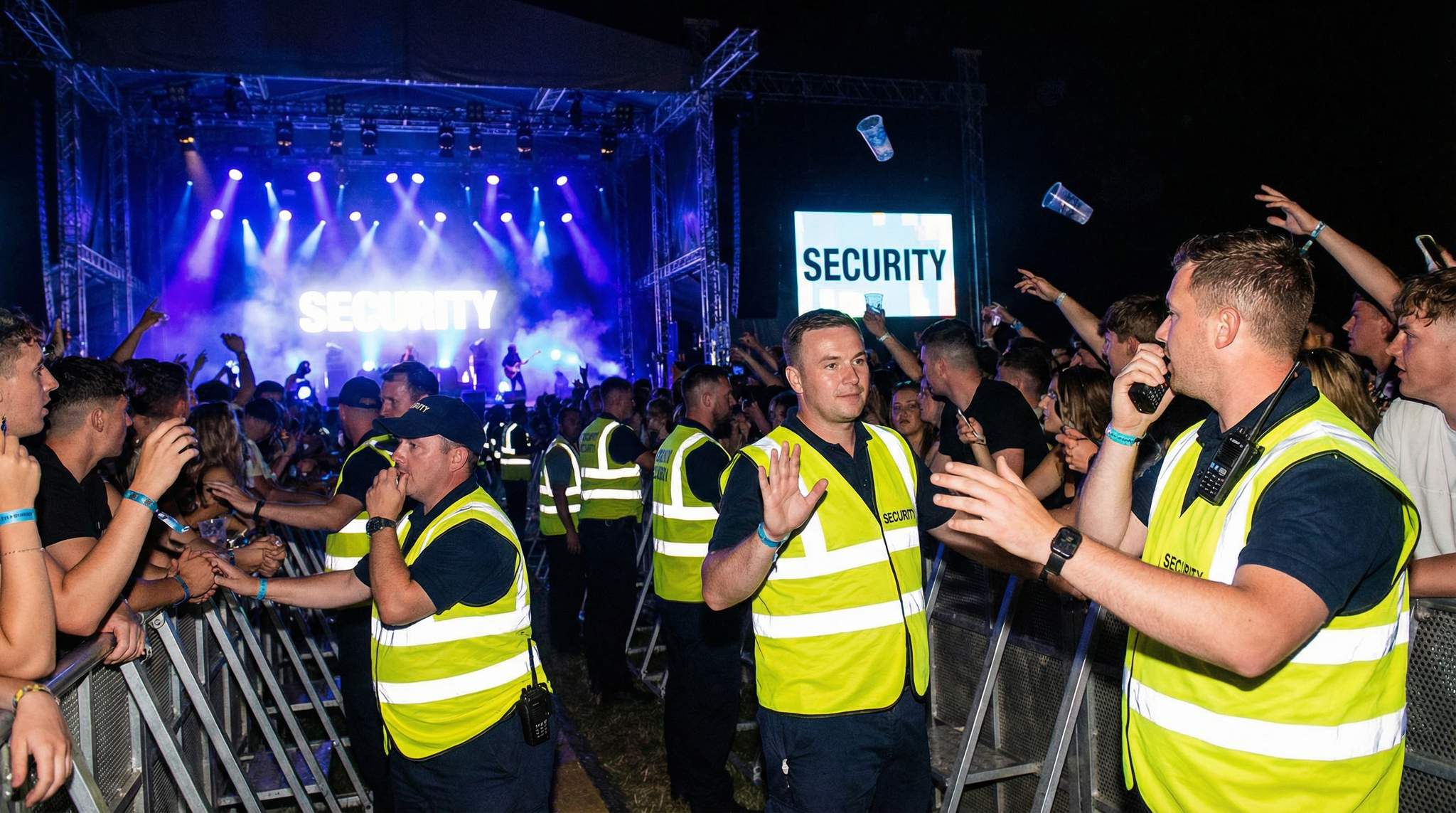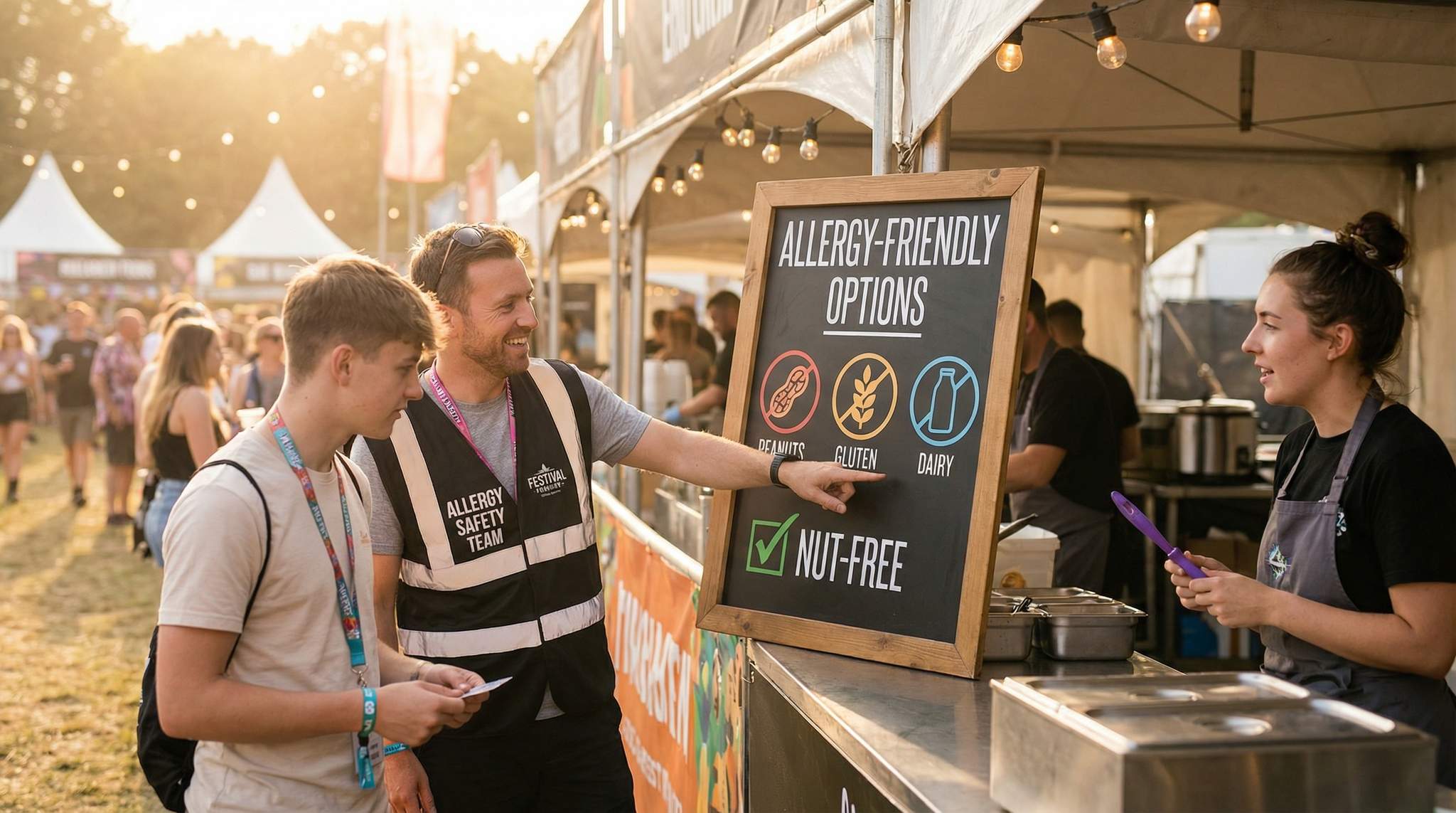No matter how passionate or capable you are as a festival organizer, you can’t do it all alone. A festival is a complex undertaking that requires a cohesive team of specialists, each handling different facets of the project. One of your early tasks is to figure out what roles you need, how to structure the team, and who’s responsible for what. I’ve learned over the years that getting the team structure right (and hiring or assigning the right people to each role) is absolutely critical; it can make the difference between a smooth production and things falling apart because “I thought you were handling that!”. In this article, we’ll walk through the key team roles typically needed to produce a festival, explain what each does, and discuss how they interact. We’ll also touch on which roles might be internal hires vs. outsourced contractors, and why clear reporting lines are essential.
Key Festival Team Roles and Their Duties
Every festival’s staffing can vary a bit depending on the size and type of event, but here are the core roles you’ll commonly find:
Festival Director / Executive Producer: This is the team captain, often the founder or the person with the festival vision. Duties include overall project oversight, decision-making on major issues, and often handling high-level stakeholder relationships (sponsors, city officials, key partners). They keep the big picture in focus – ensuring the festival fulfills its mission and stays within budget. They often sign off on major expenses and strategy. All other department heads typically report to this person.
Operations Manager / Logistics Coordinator: The Ops Manager is in charge of the nuts and bolts of the event – literally. They handle venue logistics, permits, security arrangements, site layout coordination, equipment rentals, sanitation, and all the operational components. If something involves physical infrastructure or compliance, it’s on their plate. They might also coordinate transportation, parking, and neighborhood impact issues. On site, they often run the show from the operations center, troubleshooting any logistical problems (power outages, fence issues, etc.). This person needs excellent problem-solving skills and coolness under pressure.
Production Manager / Technical Director: This role focuses on the technical production aspects, especially for festivals with stages and performances. The Production Manager ensures stages, sound systems, lighting rigs, video screens, etc., are designed and installed properly. They liaise with stage crews, audio engineers, lighting designers, and often work closely with the Ops Manager on scheduling load-in/out of production elements. They also coordinate artist technical needs – making sure each act’s tech rider (requirements for sound, mics, monitors) is provided. Essentially, they turn an empty venue into a performance-ready environment.
Talent Buyer / Programmer / Artistic Director: The person (or team) responsible for booking the content of your festival. For music festivals, this is the Talent Buyer who contacts agents and secures artists. For film festivals, it could be a Programming Director curating the film lineup. For food festivals, maybe a Culinary Curator who brings in chefs. They need a deep understanding of the genre, good industry contacts, and negotiation skills. They work within a budget to create the lineup that will attract your audience. This role also covers scheduling the performances or screenings and often coordinating contracts and payment for talent.
Planning a Festival?
Ticket Fairy's festival ticketing platform handles multi-day passes, RFID wristbands, and complex festival operations.
Marketing & Communications Manager: This person (or team) handles all publicity and advertising for the festival. Duties include creating a marketing plan, managing social media accounts, overseeing the design of promotional materials (posters, ads, website), coordinating PR (press releases, press outreach), and often ticketing strategy (like early bird releases, promo codes, etc.). They may also manage on-site communications like the festival app or program booklet. A related sub-role could be a Social Media Coordinator or PR Manager if the team is larger. They ensure the festival’s message reaches the target audience and builds excitement.
Sponsorships/Partnerships Manager: If your festival is seeking sponsors or partners, having someone dedicated to this is invaluable. They create sponsor packages, pitch to companies, negotiate deals, and then act as a liaison to make sure sponsors get what they need (branding visibility, tickets, speaking opportunities, etc.). In smaller festivals, the Festival Director or Marketing Manager may wear this hat, but if sponsorship is a big part of your financing, a focused role is wise.
Vendor Coordinator: Festivals often involve external vendors – food trucks, craft stalls, merch sellers, exhibitors. The Vendor Coordinator recruits vendors, handles their applications or contracts, assigns them booths, communicates load-in procedures, and ensures they have what they need (power, water, permits). During the festival, this person manages vendor relations, making sure vendors are following rules and are happy. They also coordinate vendor payments/fees or revenue sharing as applicable.
Volunteer Coordinator: Volunteers can be the lifeblood of many festivals – they help with ticketing, info booths, hospitality, clean-up, etc. A Volunteer Coordinator is in charge of recruiting, training, and managing all those volunteers. They might create a volunteer schedule, assign roles/shifts, and be the point person if volunteers have questions or if someone doesn’t show up. A good coordinator will also keep volunteers motivated and appreciated (snacks, t-shirts, thank-you party, etc., often fall under their care).
Hospitality/Artist Relations Manager: This role ensures that performers and VIPs have a great experience. They handle booking travel, lodging, local transport for artists, preparing green rooms or hospitality areas, and making sure riders (backstage requests like food or equipment) are fulfilled. They might manage a team of artist liaisons or runners who escort artists on site. The goal is to keep talent happy so they can perform at their best and speak positively about the festival.
Finance Manager / Accountant: Money in and out needs careful tracking. The finance role creates and manages the budget, processes payments (to vendors, artists, staff), and keeps records of all expenses and income. They’ll handle invoicing for sponsors, reconciling ticket revenue, paying taxes, and ensuring insurance payments are done. They also help with cash flow planning. For a smaller festival, this could be a part-time bookkeeper or a duty the Festival Director assumes, but it’s crucial someone is minding the money closely.
Need Festival Funding?
Get the capital you need to book headliners, secure venues, and scale your festival production.
Safety/Security Manager (and Team): Depending on the size, you may have a Security Chief or Safety Officer. This person coordinates with hired security firms, local police, and medical services. They draft the security plan, deploy guards, oversee bag checks, manage lost & found, and ensure emergency protocols are known to staff. If something goes wrong (missing child, altercation, medical emergency), they take charge alongside the Ops Manager. Some festivals also appoint a specific COVID or Health Safety Officer (especially in recent times) if health protocols are in play.
Site/Decor Manager: If your festival has elaborate site design or art installations, someone might specifically oversee decor, theming, and site aesthetics. They’d work with the Ops/Production team but focus on making the event beautiful and on-theme – from signage design to art piece placement to general ambiance.
Now, not every festival will have all these as separate people – many roles can double up or adjust depending on scale:
- A small community festival might have one person acting as both Ops Manager and Production Manager, for example.
- Or the Marketing Manager might handle sponsorships too.
- Sometimes multiple small roles can be combined into one logistic team or creative team.
The key is not to overburden one person with conflicting roles. For instance, the person making stage schedules (talent role) probably shouldn’t also be running around handling plumbing issues (ops role) during the event – they need to concentrate on their domain.
Internal Staff vs. Outsourced Experts
When assembling your team, decide which roles need to be hired in-house (as staff or core team who are with you throughout planning) and which can be outsourced or contracted for specific tasks or periods.
- Internal/Core Team: Typically the Festival Director, Ops Manager, Marketing Manager, Talent Buyer, and Finance are core. These roles require continuous involvement and overseeing the planning from start to finish. They’ll likely be part of early brainstorming and around to wrap up post-event. These are often the first people you bring on board.
- Contracted Specialists: Roles like Production Manager or Security Manager are sometimes brought in closer to the event (and might be part of a vendor service). For example, you might hire a production company that provides a Production Manager who starts 3 months out to nail down tech details. Similarly, you could contract a PR firm instead of an internal PR Manager, or use a ticketing company that provides a ticketing manager.
- Volunteers vs Staff: For budget reasons, some roles can be volunteer-based if the festival is smaller; e.g., a volunteer coordinator might themselves be a volunteer or modestly paid position. Just ensure if someone is a volunteer in a key position, they’re truly committed and ideally experienced.
- Outsourcing to Agencies: If you don’t have certain expertise, it can save headaches to outsource. Common ones include hiring an event production company (which might cover sound, lights, staging), a security firm, a cleaning/waste management service, or a ticketing provider. These come with their own managers. When you outsource, clarify how their managers fit into your org chart (e.g., the hired Production Manager from XYZ company will report to your Ops Manager or Festival Director? Should be clear).
For each role, consider:
- Expertise: Can this role be done well by someone on the team or do we need a pro? For example, technical production often needs a pro because mistakes can ruin the show or be dangerous.
- Budget: Can you afford a full-time person, or is a short-term contract more feasible? Contractors might be expensive hourly, but you use them for less time.
- Continuity: Some roles need to maintain relationships year-round (like sponsor manager maintaining sponsors, or community liaison dealing with the city). Those should be internal for consistency.
- Accountability: If something is mission-critical (e.g., safety), even if outsourced, have someone in-house overseeing that partnership who is accountable to the core team.
Organizing the Team Structure (Org Chart)
It’s wise to create an organization chart that shows who reports to whom. Clear reporting lines prevent confusion. A possible structure (for a mid-size festival) might look like:
- Festival Director (top) – oversees everything.
- Direct reports: Ops Manager, Marketing Manager, Talent Buyer, Finance Manager, and perhaps Sponsorship Manager.
- Under Ops Manager: Production Manager, Security Lead, Vendor Coordinator, Site Decor Manager, and Volunteer Coordinator might report into Ops (since those roles are very operational).
- Under Marketing Manager: maybe Social Media Coordinator, PR rep, and Ticketing/Communications staff.
- Under Talent Buyer: possibly an Artist Relations Manager reports to them, as well as stage managers during the event.
- Volunteer Coordinator may be under Ops or a separate branch depending on how vital volunteers are.
- Finance might be standalone reporting to Director, since they handle money oversight for all.
Another approach: Some festivals form teams like “Operations Team”, “Programming Team”, “Marketing Team”, etc. Each team has a lead that reports to the festival exec. But ensure one person doesn’t have two bosses; dual reporting causes issues.
Make sure everyone knows their role and who their supervisor is. For example, if something goes wrong in marketing, the Marketing Manager handles it and informs the Festival Director. If a vendor has a problem, they go to the Vendor Coordinator, not directly to the Director. Chain of command matters especially during the high-stress event days.
Also clarify decision-making authority: The Ops Manager might have discretion to spend up to $X to solve problems without checking every time, whereas anything above that or any change that impacts programming might need Director’s approval.
Clear Role Interaction and Communication
Define how roles interact:
- The Talent Buyer and Production Manager must collaborate on stage schedules and technical needs. They should have regular check-ins once the lineup is being slotted, to ensure the equipment and stage plots for each artist are prepared.
- Marketing and Sponsorship must work closely – sponsors will want logo presence in marketing materials, and marketing needs to know what sponsor commitments have been made. They might jointly produce the festival program or signage where sponsor logos appear.
- Ops Manager and Volunteer Coordinator: Ops will know where manpower is needed (ticket gates, parking, cleanup) and the volunteer coordinator will supply people. They should coordinate a staffing plan together.
- Security Lead and Ops: They design emergency and crowd flow plans together. Security may also work with the Talent team if any artist needs personal security or secure transport.
- Finance interacts with everyone in terms of approving purchases and tracking budgets. Often the finance manager will give department heads their budget limits and have them report spending.
- Artist Relations (if separate) works under Talent but must sync with Ops/Production for scheduling artist arrivals, stage times, etc., and with Marketing if any meet-and-greets or press moments are arranged.
It’s helpful to hold inter-departmental meetings periodically. In early planning, maybe monthly all-hands meetings. Closer to the festival, weekly all-hands or at least a leads meeting (all department heads). This fosters communication so no one is in a silo. For example, marketing might promise a “cooling lounge sponsored by X” to attendees, but if ops wasn’t looped in, they wouldn’t have built that into site plan or power needs. Team meetings catch those things.
Additionally, use a centralized project management tool or communication tool (like Slack or Teams) with channels for each team and some for cross-team issues (like a #logistics or #emergency channel where relevant info is shared among all leads).
Experience and Trust
Emphasize hiring experienced specialists for critical areas. If it’s your first festival, bringing someone who has done it before in key roles (like an Operations Manager who’s run similar events, or a seasoned Production Manager) can save you from rookie mistakes. It’s worth the budget if possible. They not only do their job well, but they can mentor less experienced team members and help foresee issues.
Also, ensure that each team member understands and embraces their responsibilities. One way is to have job descriptions or a responsibility matrix (sometimes called a RACI chart – Responsible, Accountable, Consulted, Informed – for each major task). It might be overkill for a small event, but even a simple list like “Volunteer Coordinator Responsibilities: recruit X volunteers, assign to A/B/C, oversee check-in, manage volunteer tent, etc.” shared with that person ensures alignment.
Importantly, address any gaps: if you realize “Wait, who is in charge of the main stage emcee and daily announcements?” assign it clearly (maybe the marketing/communications or a stage manager). If something doesn’t fall neatly under one role, decide explicitly who takes it. Nothing should be orphaned (“I thought someone else was doing it” should be avoided).
Succession and Redundancy
Festivals are intense, and sometimes a team member could burn out or become unavailable at a critical time. It’s good to have some redundancy or backup plans for key roles:
- Maybe an assistant production manager who can take over if the lead gets sick.
- Or cross-train your team: the Marketing Manager should know the basics of ticketing operations in case the Ticketing lead is stuck in traffic on opening morning, etc.
- Even for the Festival Director – empower someone (like Ops Manager or a co-director) to make decisions if you’re unreachable or need rest.
When everyone knows “if person X is not here, person Y steps in,” the machine keeps rolling.
In summary, building your festival team is like casting a movie or forming a band – you need the right mix of talents and a great chemistry of collaboration. Take time to structure it well: define roles, hire people who are up to the task, and make sure they know how they fit into the whole. A well-oiled team with clear responsibilities will anticipate things before they go wrong and cover each other’s blind spots. Then you, as the organizer, can focus on leading rather than firefighting every detail. With the right team in place, even if challenges arise (and they will), you’ll have experts in each corner ready to handle them, and that is a huge weight off your shoulders. As the saying goes, teamwork makes the dream work – and nowhere is that truer than in pulling off a fantastic festival.
Frequently Asked Questions
What are the key roles needed to organize a festival?
A comprehensive festival team includes a Festival Director for vision, an Operations Manager for logistics, and a Production Manager for technical needs. Additional core roles involve a Talent Buyer for booking, a Marketing Manager for promotion, and specific coordinators for finance, safety, vendors, and volunteers to handle specialized tasks.
What does a festival Production Manager do?
A Production Manager handles the technical execution of the event, including stage design, sound systems, lighting rigs, and video screens. They liaise with technical crews and audio engineers to fulfill artist riders and ensure all production elements are installed safely, turning a venue into a performance-ready space.
Which festival staff positions should be internal versus outsourced?
Core leadership roles like the Festival Director, Operations Manager, Talent Buyer, and Finance Manager are typically internal hires to ensure continuity. Specialized tasks requiring specific equipment or short-term focus, such as security, technical production, and waste management, are often outsourced to expert agencies or contracted for the event duration.
How should a festival organization chart be structured?
An effective festival organization chart positions the Festival Director at the top, with direct reports including the Operations, Marketing, Talent, and Finance Managers. Operational sub-roles like Security, Vendor Coordination, and Site Management typically report to the Operations Manager, establishing clear chains of command to avoid confusion during the event.
What are the duties of a Festival Volunteer Coordinator?
The Volunteer Coordinator is responsible for recruiting, training, and scheduling volunteers for tasks like ticketing, hospitality, and cleanup. They manage shift assignments, handle on-site questions, and ensure volunteer retention by organizing appreciation perks such as snacks and t-shirts, acting as the primary leader for the volunteer workforce.
Why is cross-departmental communication important for festival planning?
Effective communication between departments prevents logistical failures, such as marketing promising features that operations hasn’t planned for. Regular inter-departmental meetings and shared communication channels ensure teams like Talent and Production collaborate on stage schedules, while Marketing and Sponsorship align on branding commitments, keeping the entire event cohesive.





